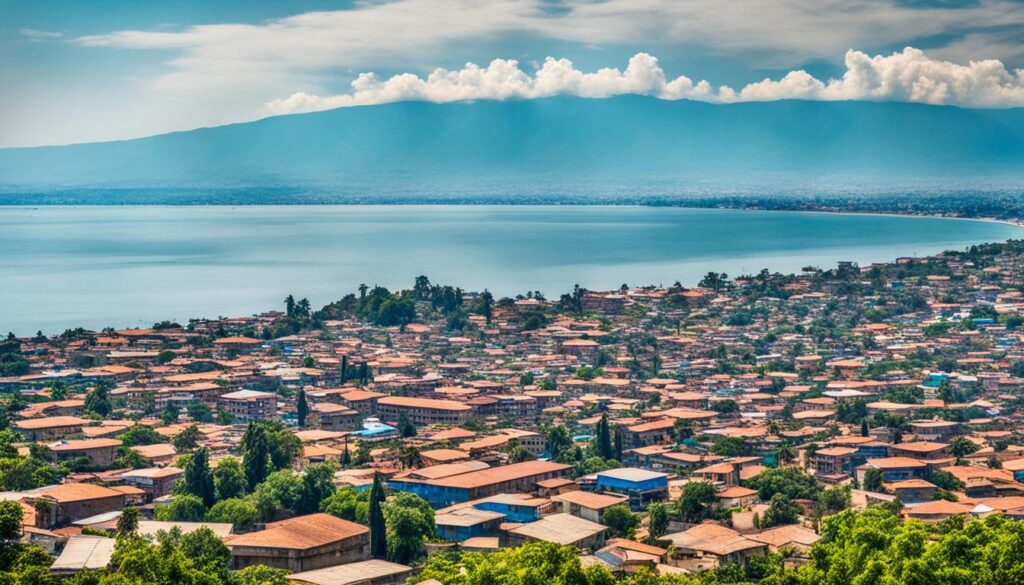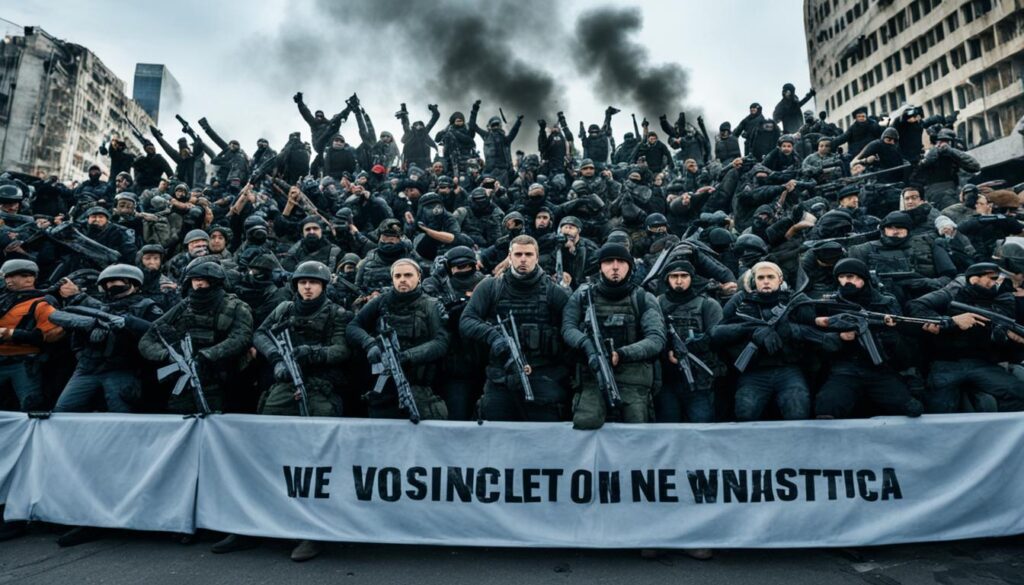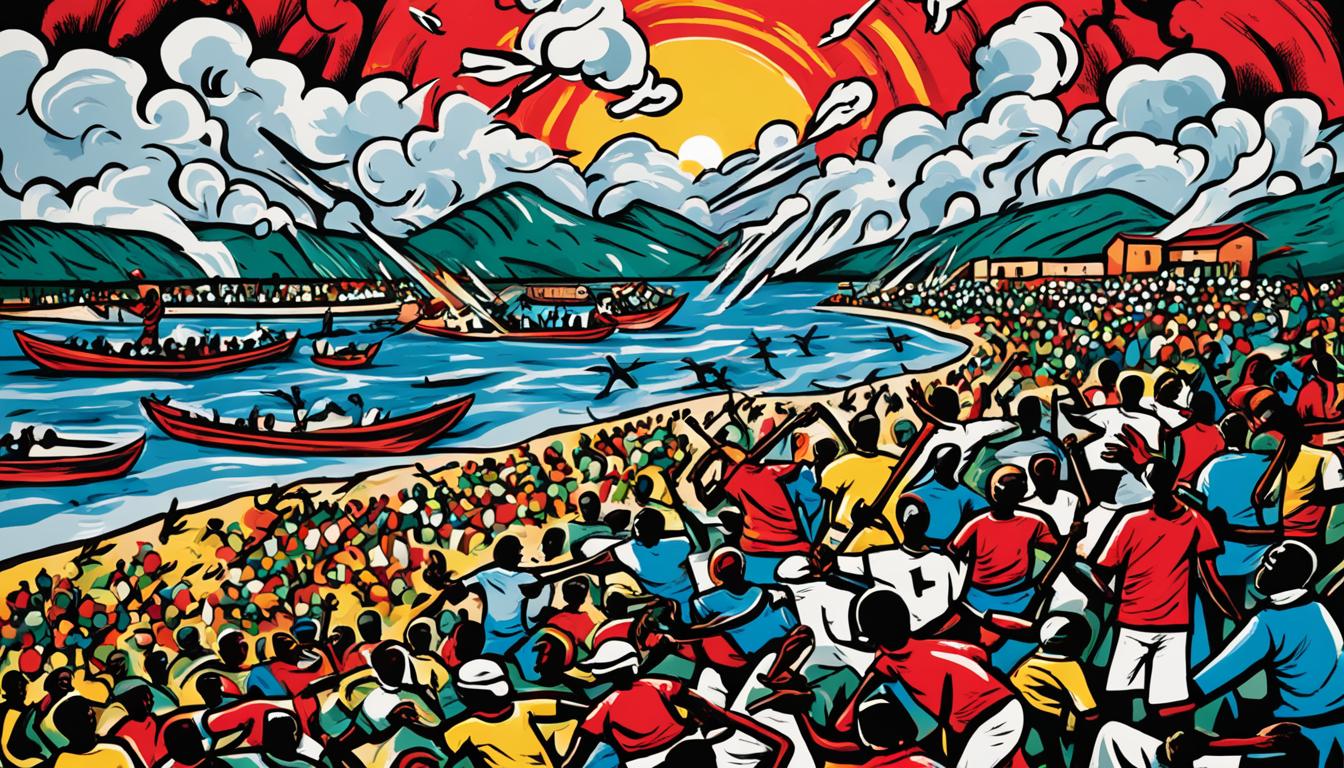Did you know that Burundi, a small nation nestled in the heart of the Great Lakes region of Africa, has been at the center of one of the most complex and protracted conflicts in modern history? With a population of just over 11 million, this landlocked country has grappled with ethnic tensions, political instability, and regional power struggles for decades, making it a critical focal point for conflict resolution efforts in the region.
This article delves into the intricacies of the Great Lakes conflict, exploring the role that the capital city of Bujumbura has played in the ongoing efforts to understand and address this multifaceted crisis. From regional oversight mechanisms to power-sharing arrangements, Burundi’s journey towards sustainable peace offers valuable insights for scholars, policymakers, and practitioners working to promote stability and reconciliation in this turbulent part of the world.
Key Takeaways
- Burundi’s strategic location in the Great Lakes region has made it a key player in the ongoing regional conflict.
- Ethnic tensions between the Hutu and Tutsi populations have been a central driver of the conflict, necessitating power-sharing arrangements and minority rights protections.
- Bujumbura, the capital city, has emerged as a hub for conflict studies and peacebuilding efforts, hosting high-level meetings and regional oversight mechanisms.
- The involvement of regional bodies, such as the African Union and SADC, has been crucial in mediating the conflict and supporting the implementation of peace agreements.
- Ongoing challenges, including the presence of armed groups and continued violence, have hindered the full realization of lasting peace in Burundi and the broader Great Lakes region.
Regional Oversight Mechanism for Peace and Security in Bujumbura
The 11th high-level meeting of the Regional Oversight Mechanism of the Peace, Security and Cooperation Framework for the Democratic Republic of the Congo (DRC) and the region will soon convene in Bujumbura, Burundi. This meeting, hosted by Burundi, is a significant step in the ongoing efforts to address the complex Great Lakes conflict resolution.
High-Level Meeting on Great Lakes Conflict Resolution
The meeting will provide a platform for key stakeholders, including Heads of State and representatives from international organizations, to review the progress and challenges in implementing the Framework agreement. The discussions will focus on the full implementation of the Nairobi and Luanda peace processes, as well as the contribution of the Contact and Coordination Group on Non-Military Measures towards strengthening regional security cooperation and eradicating armed groups in eastern DRC.
Participation of Heads of State and International Organizations
The high-level meeting is expected to attract the participation of Heads of State from the region, as well as representatives from the United Nations, African Union, ICGLR, and SADC. Their involvement underscores the importance of regional and international cooperation in addressing the persistent Great Lakes conflict.
The meeting aims to consider a draft roadmap for the revitalization of the Framework Agreement, which is a crucial step in strengthening the Regional Oversight Mechanism’s role in maintaining peace and security in the Great Lakes region.
Ethnic Tensions and the Hutu-Tutsi Conflict
Burundi’s tumultuous history has been deeply shaped by the complex ethnic tensions and the longstanding Hutu-Tutsi conflict. This divide has been a significant factor in the country’s cycles of political violence, military coups, and the Burundian civil war, which has had serious implications for regional instability.

The Hutu majority and the Tutsi minority have been engaged in a power struggle that has dominated Burundi’s political landscape for decades. This ethnic divide has often been exploited by political actors, leading to targeted assassinations, mass massacres, and the displacement of thousands of civilians. The effects of this conflict have reverberated throughout the Great Lakes region, contributing to regional instability and further exacerbating the humanitarian crisis.
Understanding the nuances of the ethnic tensions and the Hutu-Tutsi conflict is crucial in addressing the root causes of the Burundian crisis. Policymakers and international organizations must work to bridge the divide, promote inclusive governance, and ensure the protection of minority rights in order to achieve lasting peace and stability in the region.
Arusha Peace Accords and Power-Sharing Arrangements
The Arusha Peace and Reconciliation Agreement, signed in 2000, was a pivotal accord in Burundi’s peace process. This landmark agreement directly addressed the issue of ethnicity and devised a power-sharing arrangement aimed at guaranteeing security for the minority Tutsi and democracy for the majority Hutu population.
Addressing Ethnicity and Ensuring Minority Rights
The Arusha Accords sought to address the underlying ethnic tensions that had fueled the conflict in Burundi. By establishing a power-sharing framework, the agreement aimed to ensure equitable ethnic representation in the government and security forces. This was a critical step in protecting the rights of the Tutsi minority and fostering a more inclusive, democratic system.
Under the Arusha Accords, various mechanisms were put in place to safeguard minority rights, including provisions for the proportional representation of Tutsis and Hutus in key institutions, such as the parliament, the judiciary, and the military. This power-sharing arrangement was designed to promote stability, security, and trust among the different ethnic groups in Burundi.
Burundi: Great Lakes conflict studies Bujumbura Burundi
As the capital city of Burundi, Bujumbura has become a hub for conflict studies and peacebuilding efforts in the Great Lakes region. The city’s proximity to the heart of the long-standing conflict has made it a prime location for researchers, policymakers, and international organizations to gather and collaborate on resolving the complex regional dynamics.
Burundi’s central role in the Great Lakes conflict has fueled a thriving ecosystem of conflict studies and peacebuilding initiatives in Bujumbura. Leading universities, think tanks, and non-governmental organizations have established research centers and programs dedicated to understanding the historical, political, and social factors that have contributed to the region’s instability. These efforts have yielded valuable insights and strategies for promoting sustainable peace and reconciliation.

Bujumbura’s position as a hub for conflict studies has also attracted the attention of international organizations and regional bodies, such as the African Union and the Southern African Development Community (SADC). These entities have collaborated with local stakeholders to develop comprehensive approaches to addressing the challenges posed by the Great Lakes conflict, drawing on the expertise and perspectives of Burundian researchers and practitioners.
By leveraging Bujumbura’s unique position at the heart of the Great Lakes conflict, Burundi has become a key player in the ongoing efforts to foster lasting peace and stability in the region. The city’s role as a center for conflict studies and peacebuilding continues to evolve, offering valuable insights and solutions that can inform and shape the broader regional dialogue.
Role of Regional Bodies in Conflict Resolution
In the quest to address the long-standing conflict in Burundi and the broader Great Lakes region, regional bodies have played a crucial role. The African Union (AU) and the Southern African Development Community (SADC) have been at the forefront of conflict resolution efforts, leveraging their regional influence and expertise to mediate disputes and support peacebuilding initiatives.
The AU, as a pan-African organization, has been actively involved in monitoring the situation in Burundi and facilitating dialogue between the government and opposition groups. Through its various peacekeeping and peacebuilding missions, the AU has sought to maintain stability, protect civilians, and create an environment conducive to lasting peace. Similarly, the SADC, a regional economic community, has utilized its diplomatic channels to mediate negotiations and encourage political reconciliation.
African Union and SADC Interventions
The interventions of the African Union and SADC have been multifaceted, ranging from deploying peacekeeping forces to providing technical and financial assistance for peacebuilding efforts. These regional bodies have also played a crucial role in coordinating international support and garnering the commitment of the international community to the peace process in Burundi.
The collaborative efforts of regional bodies, in conjunction with national and international stakeholders, have been instrumental in addressing the underlying causes of the conflict, fostering dialogue, and promoting reconciliation. As the conflict in Burundi continues to evolve, the role of these regional bodies remains crucial in ensuring sustainable peace and security in the Great Lakes region.
Challenges in Implementing Peace Agreements
Despite the signing of the Arusha Peace Accords and other ceasefire agreements, Burundi has faced persistent challenges in implementing these peace agreements. The continued presence and activities of armed groups, such as the CNDD-FDD and the Palipehutu-FNL, have been a significant obstacle to achieving lasting peace in the region.
Armed Groups and Continued Violence
Even after the peace accords were signed, these armed groups have continued to engage in sporadic violence, undermining the fragile peace process. The inability to disarm and demobilize these groups has allowed them to maintain their influence and disrupt the implementation of power-sharing arrangements and other key provisions of the peace agreements.
The ongoing clashes between government forces and rebel groups have resulted in a cycle of continued violence, displacement, and instability in Burundi. This has made it difficult to address the underlying ethnic tensions and ensure the full participation of all parties in the political process.

Overcoming the challenges posed by these armed groups and achieving a sustainable peace remains a critical priority for the Burundian government and the international community. Continued regional and international support will be crucial in breaking this cycle of violence and ensuring the successful implementation of the peace agreements.
Peacekeeping Missions and International Support
The Great Lakes region of Africa, including Burundi, has been the subject of numerous peacekeeping missions and international support efforts aimed at resolving the ongoing conflicts and fostering long-term peace and stability. The United Nations, the African Union, and other international organizations have played a crucial role in providing military, political, and humanitarian assistance to the region.
Over the years, the UN has deployed several peacekeeping missions to the area, such as the UN Operation in Burundi (ONUB) and the UN Stabilization Mission in the Democratic Republic of the Congo (MONUSCO). These missions have worked to monitor ceasefires, disarm and demobilize combatants, and support the implementation of peace agreements. The African Union has also been actively involved, launching the African Union Mission in Burundi (AMIB) and the African Union-United Nations Hybrid Operation in Darfur (UNAMID).
Alongside the peacekeeping efforts, the international community has provided significant financial and technical support for conflict resolution and peacebuilding initiatives. This includes funding for security sector reforms, transitional justice mechanisms, and programs aimed at addressing the root causes of the conflicts, such as ethnic tensions and resource disputes.
The success of these interventions has been mixed, with challenges ranging from the continued presence of armed groups to political instability and a lack of buy-in from all parties involved. Nevertheless, the international community’s commitment to supporting peace and security in the Great Lakes region remains steadfast, as it recognizes the importance of resolving these long-standing conflicts for the well-being of the entire region.
Economic Implications of Prolonged Conflict
The lingering conflict in Burundi and the greater Great Lakes region has had profound economic implications. The prolonged instability has severely impacted development efforts and disrupted regional trade, posing significant challenges to the area’s long-term economic prosperity.
Impact on Development and Regional Trade
The conflict has stifled economic development, deterring foreign investment and hampering infrastructure projects that are crucial for growth. Additionally, the disruption of regional trade networks has constrained the flow of goods and services, hampering economic integration and collaborative efforts among neighboring countries.
The economic implications of this prolonged conflict extend beyond national borders, as the ripple effects are felt throughout the region. Sustainable recovery and the restoration of regional trade linkages are essential for addressing the significant economic challenges faced by the affected communities.

Policymakers and international organizations must prioritize economic recovery initiatives that address the root causes of the conflict and promote long-term stability. This includes investing in infrastructure, fostering cross-border cooperation, and implementing policies that encourage trade and investment in the region.
Lessons Learned from the Burundian Peace Process
The Burundian peace process offers valuable insights for future conflict resolution and peacebuilding efforts in the Great Lakes region and beyond. One key lesson is the importance of regional leadership and cooperation. The involvement of regional bodies like the African Union and SADC played a crucial role in mediating the Arusha Peace Accords and maintaining stability in Burundi.
Another critical lesson is the need for inclusive negotiations that give voice to all stakeholders, including ethnic groups and opposition parties. The power-sharing arrangements outlined in the Arusha Accords aimed to address the deep-rooted Hutu-Tutsi conflict, but their implementation has faced ongoing challenges.
The Burundian experience also highlights the complexity of addressing ethnic tensions and ensuring minority rights in post-conflict societies. Continued violence by armed groups and the uneven implementation of peace agreements underscores the difficulty of translating political settlements into lasting stability.
Finally, the Burundian peace process has demonstrated the critical role of international support and peacekeeping missions in bolstering local efforts at conflict resolution and peacebuilding. The sustained engagement of the international community, through both diplomatic and security initiatives, has been essential in maintaining progress towards a durable peace.
Conclusion
The intricacies of the Burundi and Great Lakes conflict underscore the persistent challenges of peacebuilding and regional stability in this dynamic region. Despite the progress made through the Arusha Peace Accords and various international interventions, the journey toward sustainable peace remains arduous, fraught with lingering ethnic tensions and the looming presence of armed groups.
As the world continues to grapple with the implications of this protracted conflict, the importance of Burundi and the Great Lakes region in the broader geopolitical landscape cannot be overstated. Addressing the root causes of the conflict, fostering inclusive dialogue, and strengthening regional cooperation will be crucial in paving the way for lasting peace, economic development, and social cohesion.
Moving forward, the collective efforts of Burundian stakeholders, regional bodies like the African Union and SADC, and the international community must remain steadfast in their commitment to peacebuilding, conflict resolution, and the promotion of human rights. Only through a sustained and comprehensive approach can the promise of a stable, prosperous, and equitable Burundi and Great Lakes region be realized.
Source Links
- FAVPAP012010.indd – https://www.ipinst.org/wp-content/uploads/2011/03/pdfs_favoritapaper_favoritadonia.pdf
- 11th Summit of the Regional Oversight Mechanism of the Peace, Security and Cooperation Framework for the DRC and the region. Bujumbura, Burundi, 6 May 2023 – https://ungreatlakes.unmissions.org/11th-summit-regional-oversight-mechanism-peace-security-and-cooperation-framework-drc-and-region
- Burundi – https://www.crisisgroup.org/africa/great-lakes/burundi


